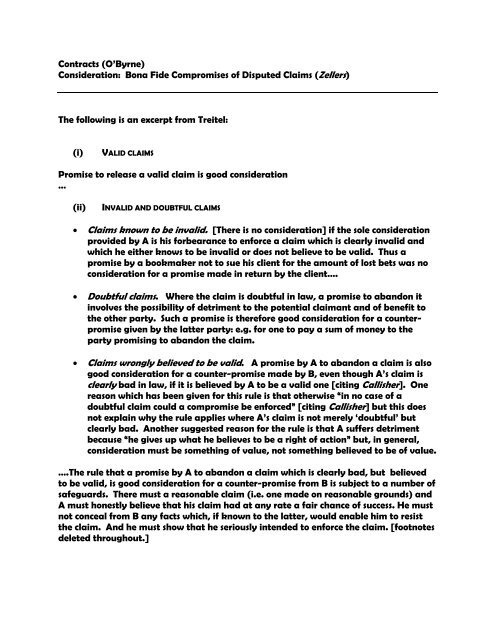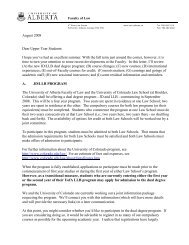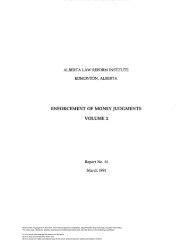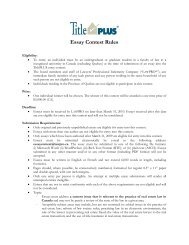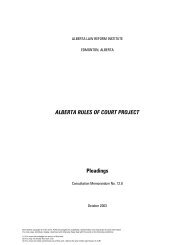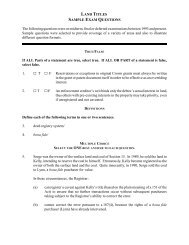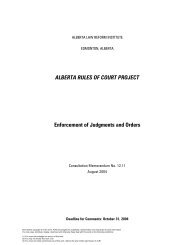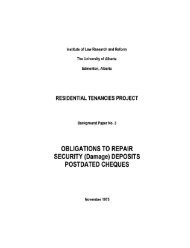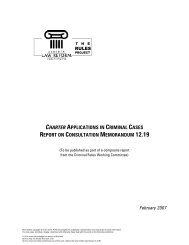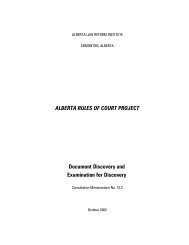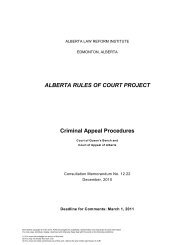Consideration: Bona Fide Compromises of Disputed Claims
Consideration: Bona Fide Compromises of Disputed Claims
Consideration: Bona Fide Compromises of Disputed Claims
You also want an ePaper? Increase the reach of your titles
YUMPU automatically turns print PDFs into web optimized ePapers that Google loves.
Contracts (O’Byrne)<strong>Consideration</strong>: <strong>Bona</strong> <strong>Fide</strong> <strong>Compromises</strong> <strong>of</strong> <strong>Disputed</strong> <strong>Claims</strong> (Zellers)The following is an excerpt from Treitel:(i)VALID CLAIMSPromise to release a valid claim is good consideration…(ii)INVALID AND DOUBTFUL CLAIMS• <strong>Claims</strong> known to be invalid. [There is no consideration] if the sole considerationprovided by A is his forbearance to enforce a claim which is clearly invalid andwhich he either knows to be invalid or does not believe to be valid. Thus apromise by a bookmaker not to sue his client for the amount <strong>of</strong> lost bets was noconsideration for a promise made in return by the client….• Doubtful claims. Where the claim is doubtful in law, a promise to abandon itinvolves the possibility <strong>of</strong> detriment to the potential claimant and <strong>of</strong> benefit tothe other party. Such a promise is therefore good consideration for a counterpromisegiven by the latter party: e.g. for one to pay a sum <strong>of</strong> money to theparty promising to abandon the claim.• <strong>Claims</strong> wrongly believed to be valid. A promise by A to abandon a claim is alsogood consideration for a counter-promise made by B, even though A’s claim isclearly bad in law, if it is believed by A to be a valid one [citing Callisher]. Onereason which has been given for this rule is that otherwise “in no case <strong>of</strong> adoubtful claim could a compromise be enforced” [citing Callisher] but this doesnot explain why the rule applies where A’s claim is not merely ‘doubtful’ butclearly bad. Another suggested reason for the rule is that A suffers detrimentbecause “he gives up what he believes to be a right <strong>of</strong> action” but, in general,consideration must be something <strong>of</strong> value, not something believed to be <strong>of</strong> value.….The rule that a promise by A to abandon a claim which is clearly bad, but believedto be valid, is good consideration for a counter-promise from B is subject to a number <strong>of</strong>safeguards. There must a reasonable claim (i.e. one made on reasonable grounds) andA must honestly believe that his claim had at any rate a fair chance <strong>of</strong> success. He mustnot conceal from B any facts which, if known to the latter, would enable him to resistthe claim. And he must show that he seriously intended to enforce the claim. [footnotesdeleted throughout.]
2Zellers caseI. Threatened action #1:Zellers (would-be plaintiff) threatens to sue D.C.B.(the mom) (would-be defendant) for $225.00 ascompensation for damages Zellers says is sustaineddue to the son's shoplifting.The mom paid Zellers $225.00 in exchange for which Zellers promised not to sue her(i.e.: the alleged consideration from Zellers supporting the mom's payment isforbearance to sue.)II.Action #2 (subject matter <strong>of</strong> this case)D.C.B. (plaintiff; the mom) seeksto recover the $225.00 she paid toZellers discussed above.Zellers (defendant) resistsaction on basis that it providedconsideration to the mom viaforbearance.Legal issue: Was payment by D.C.B. supported by consideration from Zellers? Whathas Zellers given up in exchange for the payment <strong>of</strong> $225.00 from the mom?


